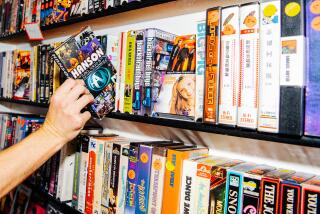A Moment in Time With the Seoul Highlights
- Share via
If NBC’s deluge of commercials during its Olympics coverage was too much for you, don’t despair. By the last week of this month, if all goes swimmingly, sports fans will have an ad-free way of watching 90 minutes of Janet Evans, Greg Louganis, Matt Biondi, Carl Lewis, et al. do their medal-winning stuff when Wood Knapp Video releases “Highlights of the 1988 Summer Olympics--Seoul” for $29.95.
Production began on the compilation “with the last burst of fireworks of the closing ceremonies at Seoul’s Olympic stadium,” according to a Wood Knapp spokesperson, and production time was hoped to take no longer than two weeks.
After the release of the highlights tape, the company--which has an exclusive deal with NBC--will also make six more Olympic tapes available, each focusing on different sports: gymnastics, water sports, men’s track and field, women’s track and field, boxing and volleyball.
These cassettes, to be released in early November, will run approximately 45 minutes each and will be priced at $19.95 each. A gift set containing all seven will be sold for $99.95.
No-Go Video: The video industry comes up with all kinds of silly nonsense, but little of it is goofier than the continuing fuss over a “dual-deck VCR.”
An Arizona firm called Go-Video has been threatening to market one for two years now, and the entertainment press has repeatedly reported the supposedly significant news about the machine and the worry it has spawned in the film industry that people would use it to make copies of movies on cassette.
Daily Variety decided that the latest news rated a front-page banner headline: “Go-Video Chips Up Pirates.”
The story: Go-Video has decided to buckle in to the criticism of the Motion Picture Producers Assn. of America and others by adding an anti-copying chip.
The odd thing about all this is that the Go-Video dual-cassette, VHS-format deck has never seemed all that revolutionary. Anyone who wants to copy a video (at least one that doesn’t have Macrovision or some other anti-copying device applied) has always been able to do so by connecting two cheap VHS decks.
Since the Go-Video deck--if it ever comes to market--is supposed to cost considerably more than a bottom-of-the-line VCR, its potential as a big seller has always been dubious. And now Go-Video has thrown in the final ridiculous straw--or chip: According to Variety, “the system would require a special encoding on the tapes that copyright holders wish to protect.”
If the company is really going to put out such decks, just why would anyone want one?
The final indignity?: RCA--long a leading proponent of VHS-format VCRs--is running an ad that makes a “Trade-a-Beta” offer. Just how much can you get for that Beta deck you paid $400 to $1,200 for?
Just $50. And not in cash either--just trade-in allowance on “a new RCA stereo VCR.” In this case, the V in VCR seems to stand for victory --with a vengeance.
On the other hand, video companies are giving Beta-machine owners a reason to hold on to their models. Several films that come out at prices such as $89.95 for the VHS version carry a $29.95 tag for the Beta copies--putting them within the buying range of customers who would otherwise only rent.
That is, if they can find the Beta versions at video stores, which are increasingly reluctant to stock the going-under underdog format.
More to Read
Go beyond the scoreboard
Get the latest on L.A.'s teams in the daily Sports Report newsletter.
You may occasionally receive promotional content from the Los Angeles Times.






